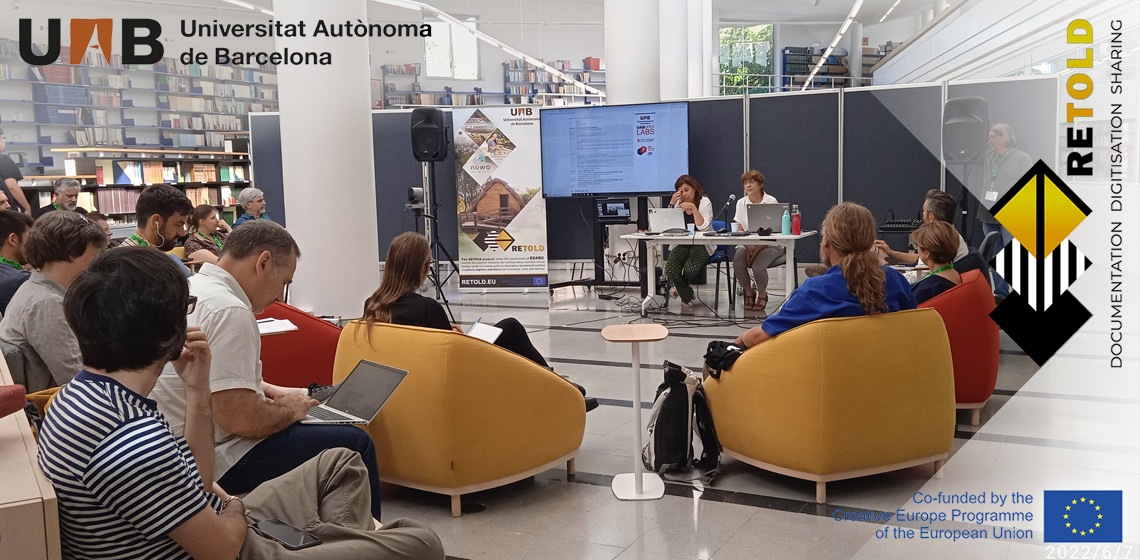The content is published under a Creative Commons Attribution Non-Commercial 4.0 License.
Unreviewed Mixed Matters Article:
RETOLD: Review of the Meeting at the Universitat Autònoma de Barcelona (UAB), June 2022

In June 2022, the first onsite RETOLD project meeting took place in the Universitat Autònoma de Barcelona (UAB), hosted, and organised by the Prehistory department. This was the first time that all partners met face-to-face. The Prehistory department coordinates an MA in digital humanities as well as manages the archaeological research of different archaeological sites, some of which are actual archaeological open-air museums like “Campus d’Arqueologia de La Noguera” and “Campus d’Arqueologia de La Draga”, both in Catalonia.
The meeting in Barcelona was important to introduce the RETOLD project to a wider public of specialists and students, and to test the idea of the web-app for the first time with all partners and some expert guests.
This first meeting was very much anticipated, after the two years of COVID pandemic without the opportunity to meet the whole group in person. Online communication had been good, but working onsite can be much clearer and smoother. The main objective of this meeting was to achieve a first agreement between non-museum and museum partners on the goals and needs of the web-app, and partly to know the needs of museum partners for digitising their sites.
Monday 6th and Thursday 9th were arrival and departure days, as well as for internal meetings between partners. The 7th and 8th were the core days of the programme, and part of these were open for the public and for students. The 9th and 10th focused on meetings between partners.
7 June 2022
The morning 7th of June was dedicated to sharing experiences around digital archaeological heritage used by professionals and researchers, and accessible to the public. Roeland Paardekooper, representing EXARC (NL) as the main coordinator of the RETOLD project, presented a speech about “Archaeological Open-Air Museums and why we need RETOLD”. Professor Joan Anton Barceló-Álvarez from the Prehistory department talked about ‘“Intelligent” Archaeology through Technology?’ Professor Nicolò Dell’Unto, from the Archaeology and Ancient History department of Lund University in Sweden, presented “Research Assets in the Digital Space. Exploring the potentials of 3D Web Platforms to support research in Archaeology”.
The last three presentations in the morning were by senior researcher Sofia Pescarin from the Istituto di Scienze del Patrimonio culturale del Consiglio Nazionale delle Richerche (CNR ISPC) and the University of Bologna (Italy), titled “rewinding virtuality: the new challenges of virtual heritage”; Héctor Orengo, researcher from the Institut Català d’Arqueologia Clàssica (ICAC) spoke about “current computational approaches to archaeological research at GIAP-ICAC", and finally, Oriol Vicente from UAB ended the morning introducing the cultural heritage unity of the Autonoma University of Barcelona.
The afternoon was devoted to one-to-one meetings between partners to get to know each other, as well as meetings between the lead partner and each partner involved in the project. Nüwa Digital Media Content Production Studios Ltd, the Irish partner of the project, made an individual test for each partner to draw a first map of web-app content.
8 June 2022
In the morning of Wednesday 8th of June, the UAB organised a round-table discussion to confront different scholars (Joan Anton Barceló, Nicolò dell’Unto, Sofia Pescarin and Héctor Orengo) with perspectives on digital archaeological heritage. After the discussion, the group visited the UAB Open Labs (https://www.uab.cat/open-labs/) that are defined like open innovation ecosystems to solve the social challenges of the territory. The Open Lab based in the humanities Faculty has the necessary digital hardware to be used by students and researchers for their own projects.
During the afternoon, there was a focus group session with the conclusions of and comments on the previous afternoon’s testing by Nüwa digital Media.
To conclude, the meeting in Barcelona was important as a first step to get to know each other in person and to have a clearer idea about the digital needs of our Archaeological Open-Air Museums (AOAM).
Keywords
Country
- Spain

